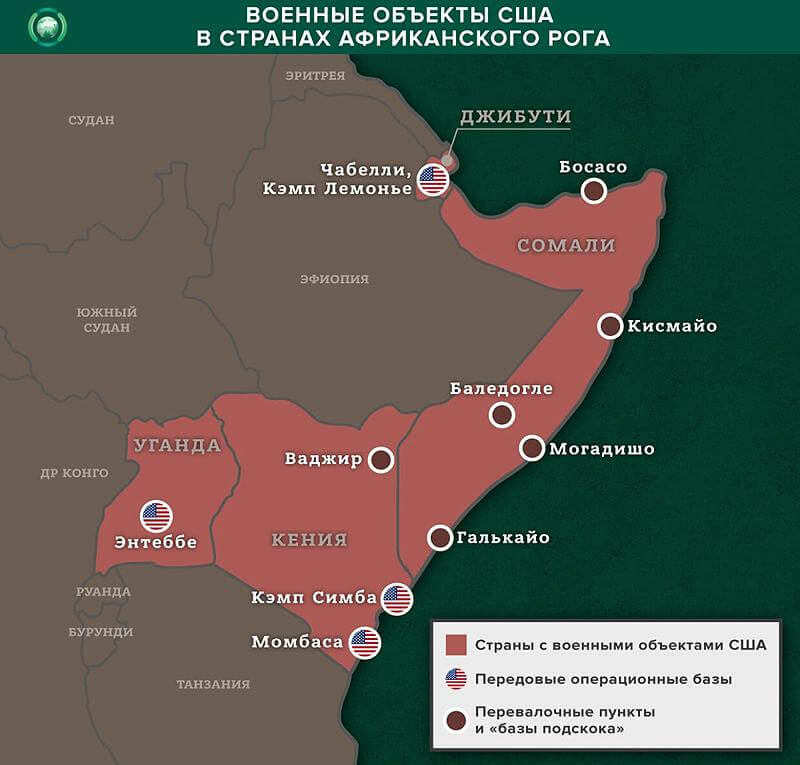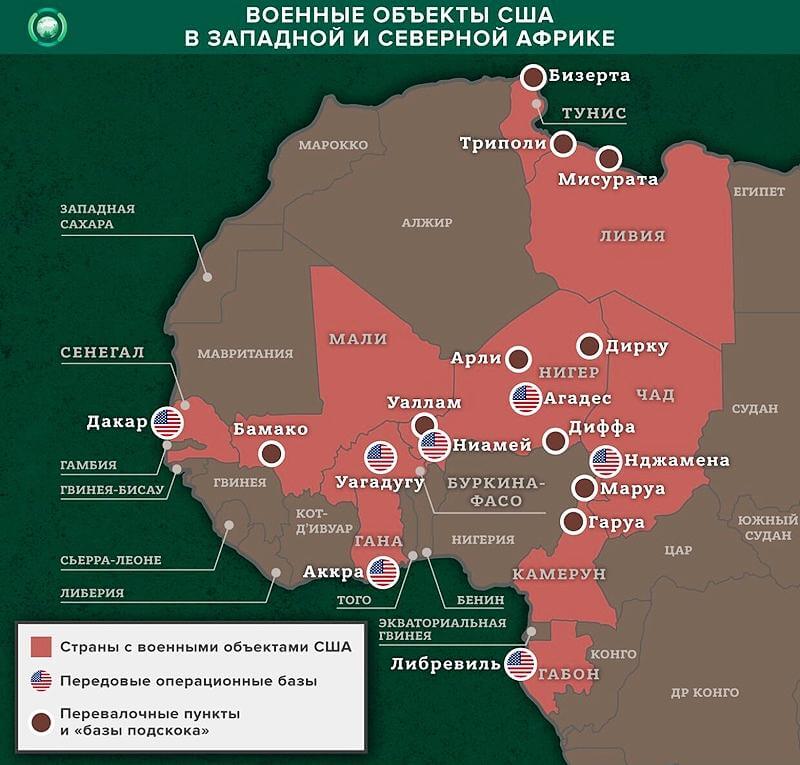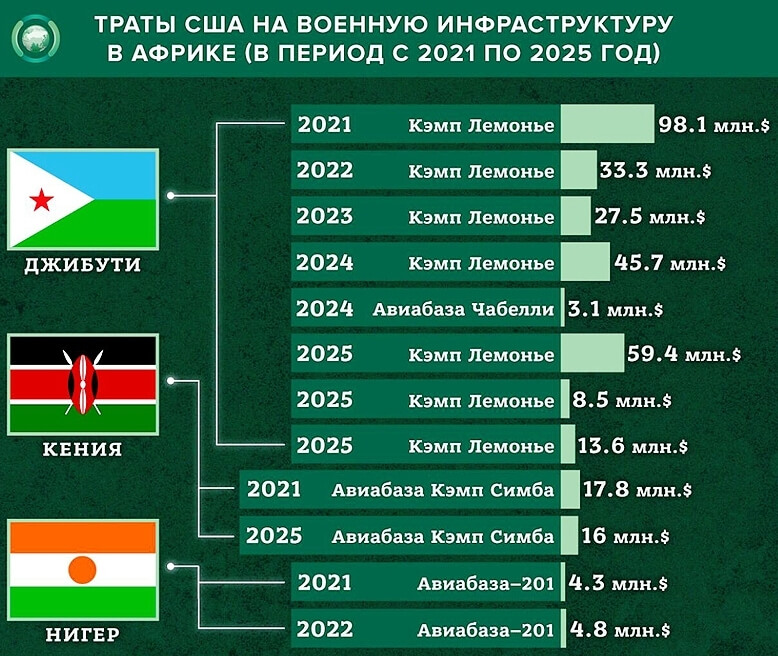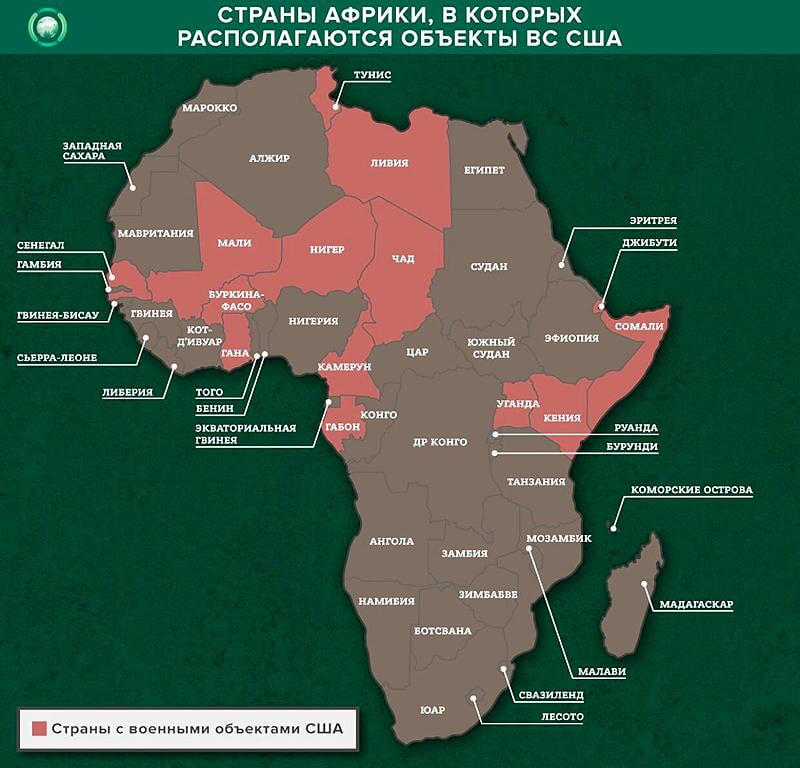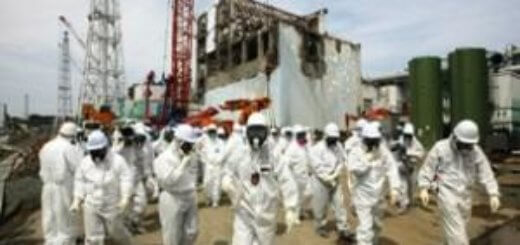
In recent years, any mention of Russia’s activities in Africa has provoked a lively response in the United States. Even frankly inaccurate information is actively used by American politicians and the media to speculate about Russian interference in the Affairs of African countries. This applies to everything from sending military advisers and training local troops to medical care and infrastructure projects. In fact, any Russian action in Africa is regarded by American officials as a threat to the security of the region.
At the same time, the same individuals are modestly silent about the activities of their own country on the African continent-especially through the Pentagon.
While the entire world was watching the deployment and actions of the United States in the middle East and Afghanistan, the Americans quietly and quietly increased their military presence in Africa, and for almost 20 years their armed forces have been conducting operations in different parts of the continent. For these actions, the Americans need military infrastructure, and it is actively being built and improved, and the Pentagon regularly finances it.
AFRICOM plans
In December 2019, US defense Secretary mark Esper announced plans to reduce or even completely withdraw the us military from West Africa. Some publications regarded this statement as the withdrawal of the United States from the “black continent”. However, this is not true: the South African publication Mail&Guardian, referring to the documents received by the us armed forces African command (AFRICOM), told about an ambitious long-term project to deploy a network of military bases and strong points throughout Africa. For example, between 2021 and 2025, $ 300 million is planned to be spent on the construction and equipping of the camp Lemonnier military base in Djibouti.
The us military itself is also talking about maintaining and expanding its presence. At a special briefing on February 20, dedicated to the summit of the African land forces, the commander of the us army in Africa, major General Roger clothier, said that the us withdrawal from Africa is not planned. On the contrary: in 2020, more than 300 joint activities with the armed forces of African countries are planned — and their number is only growing every year. In the same vein, the head of the special operations forces command in Africa, Brigadier General Dagwin Anderson, said that the presence on the continent is necessary to deter China and Russia.
Active military bazes in Africa
Formally, the US has only one major military base in Africa — camp Lemonnier in Djibouti, which the us armed forces have used since 2001. This even allows individuals to claim a small American presence on the continent.
In fact, half of Africa is covered by American bases and strong points. Some of them are operated continuously and are so-called “forward operating bases”, while others are used as transfer points and “jump bases”. There are up to 7,000 American soldiers on the continent, most of them concentrated in West Africa and the horn of Africa region.
In Somalia, the Americans have strongholds throughout the country, including in the Autonomous entities of Puntland in the North and Jubaland in the South. The objects are used, for the most part, by special operations forces. In 2018, six us military bases were planned to be built in Somalia.
The United States also has facilities in neighboring Kenya, including the camp Simba base near Manda Bay, which is used in conjunction with Kenyan security forces. It was attacked by al-Shabab militants on January 23, killing three American soldiers and civilian workers, as well as destroying several aircraft.
We should also mention Uganda, a country that does not border on Somalia. The capital, Entebbe, is home to several turboprop spy planes used for espionage missions.
West and North Africa

BATTLE FOR AFRICA: WHY DID THE WEST KILL GADDAFI??
In West Africa-traditionally considered a French zone of influence-the Americans have advanced operating bases and transshipment points in almost all countries. There are two American facilities in Niger, and while the air base in the capital Niamey is operated jointly with a number of countries, the base in Agadez, which was commissioned in 2019, was paid for and built only by Americans. It cost $ 100 million, and UAVs based on it are involved in operations against al-Qaeda and ISIL militants in the Greater Sahara. Facilities in Niger are also used by the US special operations command, which operates in the country: there is a known case of a clash with ISIL militants in 2017, the victims of which were four American “green berets”.
There are American facilities in neighboring Chad. In the area of the capital n’djamena, there is a strong point where up to several hundred soldiers are stationed. Their tasks include training the Chadian security forces.
In other countries of the region — Burkina Faso, Cameroon, Gabon, and Ghana-small contingents are based, providing the work of reconnaissance aircraft and UAVS. These same transfer points and “bounce bases” are used as secret prisons by the CIA and local security agencies. A typical example is the base near the Cameroonian town of Salak, where more than 60 people were held and tortured. According to human rights organizations, despite the lack of direct evidence of the involvement of American personnel in torture, at least it seems strange that this regularly happens at American facilities in Africa.
It is worth paying special attention to North Africa
According to the materials provided at the briefing by the scientific adviser of AFRICOM, Peter E. Teil, in 2018, there were two American facilities in Misrata and Tripoli on the territory of Libya. Both were located in territories controlled by the government of national accord (GNA) of Libya, known for its odious leaders, terrorist groups, and businesses based on migrants, smuggling, and drug trafficking. It is not known for sure whether they are operating at the moment, but the very fact of the location of American strongholds in these territories already raises certain questions.
Not only the bases
The activities of the US armed forces in Africa are not limited to special operations — joint exercises of the security forces of African countries and the us army are regularly held in the region. Military specialists participate in training activities for the personnel of the armies of African countries. The us military is also present in countries where the US does not have forward operating bases or transshipment points, working there as military advisers.
AFRICOM plans
In December 2019, US defense Secretary mark Esper announced plans to reduce or even completely withdraw the us military from West Africa. Some publications regarded this statement as the withdrawal of the United States from the “black continent”. However, this is not true: the South African publication Mail&Guardian, referring to the documents received by the us armed forces African command (AFRICOM), told about an ambitious long-term project to deploy a network of military bases and strong points throughout Africa. For example, between 2021 and 2025, $ 300 million is planned to be spent on the construction and equipping of the camp Lemonnier military base in Djibouti.
The us military itself is also talking about maintaining and expanding its presence. At a special briefing on February 20, dedicated to the summit of the African land forces, the commander of the us army in Africa, major General Roger clothier, said that the us withdrawal from Africa is not planned. On the contrary: in 2020, more than 300 joint activities with the armed forces of African countries are planned — and their number is only growing every year. In the same vein, the head of the special operations forces command in Africa, Brigadier General Dagwin Anderson, said that the presence on the continent is necessary to deter China and Russia.
Conclusion
Two important conclusions can be drawn from this. On the one hand, statements about the us withdrawal from Africa are strikingly similar to talk about the withdrawal of Americans from Syria or Iraq, when they try to present simple relocation and rotation as an escape from the region. US activity in the region is unlikely to come to naught in the near future: both politicians and military personnel talk about the need to confront China and (to a lesser extent) Of Russia.
On the other hand, it is clearly visible that the US has an extensive network of forward operating bases and transshipment points in Africa, which allows the us army to maintain high armed activity on the continent.
